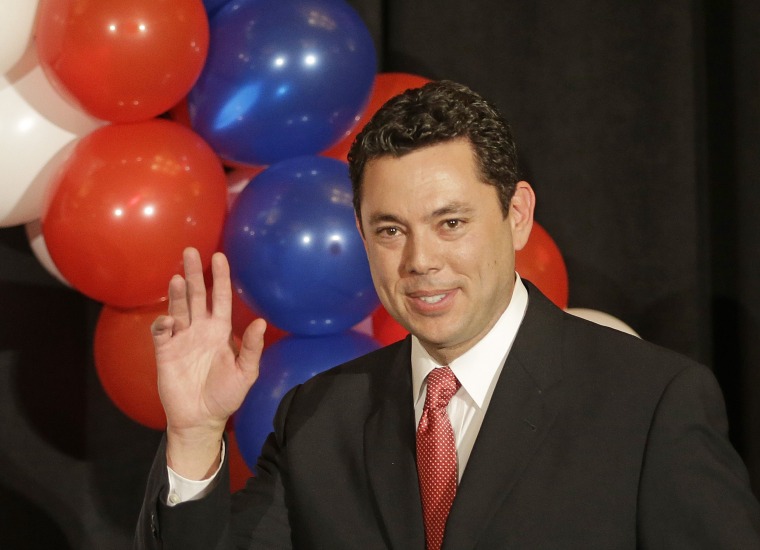In the hours following the release of a vulgar video of Donald Trump speaking about women, a stream of politicians from Utah announced that they could not support the Republican nominee. But for Republicans running for re-election in battleground states, their nearly universal condemnation of Trump falls short of an un-endorsement.
The severity of the statement, especially by those running for re-election, represents the popularity of Trump in their state or district.
Rep. Jason Chaffetz of Utah is just one of a handful of Utah politicians who released strong statements against Trump. Chaffetz, who had previously endorsed Trump, said Friday night that the latest reveal on Trump has caused him to draw the line. He said he withdraws his endorsement.
Sen. Mike Lee of Utah has never come out in support of Trump but went further than he has publicly before saying on Facebook that Trump is a "distraction" and that "it’s time for him to step aside."
The current governor of Utah, Gary Herbert, said he "will not vote for Trump" and former Gov. Jon Huntsman, who just endorsed Trump last week, rescinded his endorsement and told the Salt Lake City Tribune that "the time has come for Governor Pence to lead the ticket."
While these politicians’ positions break with the mainstream of their party — House Speaker Paul Ryan condemned but didn’t un-endorse Trump — they didn’t break from the majority of voters in their state.
Utah is solidly Republican, but many of its voters are no fans of Trump. The largely Mormon electorate has been skeptical of Trump and the most recent polling shows that Trump is only winning by nine points there, leaving room a non-Republican, possibly even a third party candidate to win there.
The pressure on Republicans running for House and Senate seats to distance themselves from Donald Trump became more intense Friday night, but the officials’ statements accurately reflect the environment in their race.
Six of the seven Republicans most at risk of losing their election put out statements condemning Trump’s behavior in the video. Words commonly used in a flood of statements via email or on social media included offensive, inappropriate, outrageous and unacceptable.
RELATED: GOP Leaders Slam Trump Over Crude Remarks on Women
"The comments were offensive and wrong and he was right to apologize," said Sen. Rob Portman of Ohio.
"His comments are totally inappropriate and offensive," said Sen. Kelly Ayotte of New Hampshire. Earlier this week, Ayotte was forced to walk back comments she made at a debate where she said Trump is a "role model" for children.
And similarly, Sen. Richard Burr of North Carolina said, "The comments are inappropriate and completely unacceptable."
"Donald Trump’s comments were outrageous and unacceptable," tweeted Sen. Pat Toomey of Pennsylvania.
But the Democrats have already begun to use this against these candidates and are calling for Republicans to withdraw their endorsements of Trump.
"Denouncing Trump’s obviously disgusting comments is not enough.The remaining question is whether Republicans will continue to support his candidacy and call him a role model. Trump’s abhorrent comments are not a one-off," the Democratic National Committee released in a statement.
Burr, Ayotte, Toomey and Portman are not only in tight re-election battles, but they also hail from battleground states in the presidential election. As of Friday morning, Trump is competitive in Ohio, New Hampshire and North Carolina, and he still was considered to be within striking distance of Pennsylvania, and offending Trump supporters could harm their own chances of re-election.
Some members have withdrawn their endorsements, however. The ones that have done so represent districts where it serves them well to do so.
RELATED: Deconstructing Donald Trump's Apology Video
Rep. Barbara Comstock said that "in light of" Trump’s comments, he "should step aside and allow our party to replace him with Mike Pence or another appropriate nominee from the Republican Party."
Comstock represents Northern Virginia — the Washington D.C. suburbs — a highly educated and affluent area where Trump is not popular among Republicans. They overwhelmingly backed Sen. Marco Rubio in the primary.
Rep. Mike Coffman of Colorado also called for Trump to step down "for the good of the country and to give [the] GOP a chance to defeat Clinton." Coffman is in a difficult re-election in the Denver suburbs. Even though Colorado was expected to be a battleground state, Trump is struggling there.
Sen. Mark Kirk of Illinois also put out a harsh statement, saying that Trump should step aside. Kirk is at risk of losing his re-election in the blue state that Trump has no chance of winning.
Rep. Todd Young of Indiana, running in an open seat, had not put out a statement as of 1:30 a.m. Saturday. Indiana is leaning toward Trump. It's part of the Rust Belt that has been Trump's base of support.

